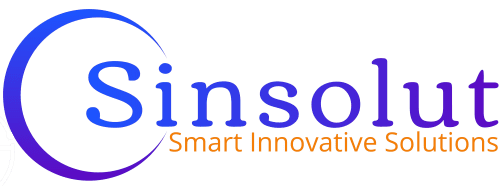
At Sinsolut Technologies, we specialize in the seamless implementation of Zoho products across diverse industries. With a proven track record in real estate, tours and travel, financial institutions, architecture, insurance, and educational facilities, we have honed our expertise to deliver tailored solutions that meet the unique needs of each sector. However, our versatility extends beyond these industries. While we excel in these domains, we remain agile and adaptable, ready to implement Zoho products effectively in any industry. Our commitment to excellence, coupled with our deep understanding of Zoho's capabilities, enables us to empower businesses across various sectors to optimize operations, enhance productivity, and achieve their strategic objectives.

At Sinsolut Technologies, we pride ourselves on being a reputable and authorized Zoho Partner, dedicated to delivering top-tier ICT solutions tailored to your business needs. As a testament to our credibility and expertise, we are officially listed on the Zoho Partner Directory.
Partner with us to harness the full potential of Zoho's innovative solutions, backed by our commitment to excellence and seamless implementation.
Implemented Use Cases
Zoho offers a comprehensive all-in-one suite of integrated applications called Zoho One or a combination function-based Zoho Products depending on the department such as Zoho CRM Plus for sales and marketing, Zoho Finance Plus for the finance department, Zoho People Plus for the Human Resource department, Zoho Workplace for operations and communications, Zoho IT Management for the ICT department and Zoho Marketing Plus for the marketing department or individual modules such as Zoho Books for accounting and finance. All these products are designed to cater to the needs of both corporate customers and small businesses.
When implemented in a financial institution, Zoho One can be integrated to create a unified ecosystem that addresses various needs across different departments and functions. Let's explore how each product within Zoho One can be utilized in a financial institution, with a special focus on loan management using Zoho Creator:
Zoho CRM Plus: Zoho CRM Plus provides a robust customer relationship management solution tailored for financial institutions. It enables the management of leads, contacts, and opportunities, as well as tracking customer interactions. The CRM can be used to manage client relationships throughout the loan lifecycle, from initial contact to post-loan servicing.
Zoho Analytics: Zoho Analytics offers advanced reporting and analytics capabilities, allowing financial institutions to gain insights into loan performance, portfolio risk, and customer behavior. Custom reports and dashboards can be created to monitor key metrics and track trends, enabling informed decision-making.
Zoho Books: Zoho Books serves as a comprehensive accounting software solution, facilitating financial management tasks such as invoicing, expense tracking, and budgeting. It can be used to manage loan-related finances, track disbursements, and generate financial reports for regulatory compliance.
Zoho Campaigns: Zoho Campaigns enables marketing automation and email campaigns to engage with clients and prospects. Financial institutions can use it to communicate loan offerings, promotions, and updates to targeted audiences, driving customer acquisition and retention.
Zoho Desk: Zoho Desk streamlines customer support processes, allowing financial institutions to provide timely assistance to loan applicants and borrowers. It offers ticket management, knowledge base creation, and customer self-service portals to enhance the loan servicing experience.
Zoho Projects: Zoho Projects facilitates project management for loan processing and portfolio management initiatives. It allows for task tracking, collaboration, and document sharing among teams responsible for underwriting, approval, and monitoring of loans.
Zoho Recruit: Zoho Recruit simplifies the recruitment process for hiring loan officers and support staff. It enables job posting, candidate sourcing, and applicant tracking, ensuring financial institutions attract and hire qualified professionals to support loan operations.
Zoho Sign: Zoho Sign offers electronic signature capabilities to digitize loan documentation and agreements. Financial institutions can streamline the loan approval process by allowing borrowers to electronically sign loan documents securely and conveniently.
Zoho Creator: Zoho Creator allows for the creation of custom applications tailored to specific loan management requirements. Financial institutions can develop custom loan origination systems, borrower portals, and risk assessment tools to automate and streamline loan processes.
By integrating these products within Zoho One, financial institutions can create a unified platform that centralizes loan management operations, enhances customer service, and drives efficiency throughout the loan lifecycle.

Zoho offers a suite of products that cater to the needs of both corporate customers and small businesses, making it an ideal solution for tours and travel companies. Let's explore how each Zoho product can be implemented and integrated to streamline operations in a tours and travel company:
Zoho CRM: Zoho CRM serves as the central hub for managing customer relationships and bookings. It enables the tracking of leads, contacts, and opportunities, allowing tour operators to personalize interactions and provide tailored travel experiences. Integration with booking platforms and communication channels ensures seamless coordination and communication with clients.
Zoho Bookings: Zoho Bookings simplifies appointment scheduling and management for tours and travel companies. It enables clients to book tours, activities, and accommodations online, while also allowing staff to manage availability, accept payments, and send reminders. Integration with CRM ensures that bookings are seamlessly captured and synchronized with customer records.
Zoho Desk: Zoho Desk streamlines customer support processes, allowing tour operators to provide timely assistance and resolve inquiries efficiently. It offers ticket management, knowledge base creation, and multichannel support, enabling agents to handle customer inquiries via email, chat, or social media with ease.
Zoho SalesIQ: Zoho SalesIQ enables live chat support and website visitor tracking, enhancing customer engagement and conversion on tour company websites. It allows agents to proactively engage with website visitors, answer questions, and provide assistance in real-time, ultimately driving bookings and increasing customer satisfaction.
Zoho Survey: Zoho Survey facilitates the collection of feedback and insights from tour participants, helping tour companies measure satisfaction levels and identify areas for improvement. Customized surveys can be created to gather feedback on tour experiences, accommodations, transportation, and overall satisfaction, enabling tour operators to enhance service quality and customer satisfaction.
Zoho Social: Zoho Social helps tour companies manage their social media presence and engage with customers on popular platforms such as Facebook, Instagram, and Twitter. It allows for content scheduling, monitoring of social conversations, and performance tracking, enabling tour operators to build brand awareness, drive engagement, and attract new customers.
Zoho Analytics: Zoho Analytics provides advanced reporting and analytics capabilities, allowing tour companies to gain insights into key performance metrics, customer preferences, and market trends. Customized reports and dashboards can be created to track bookings, revenue, customer demographics, and tour performance, enabling informed decision-making and strategic planning.
Zoho Expense: Zoho Expense simplifies expense management for tour companies, allowing staff to submit, track, and reconcile travel expenses easily. It offers features for receipt scanning, expense categorization, and reimbursement processing, ensuring accurate and efficient expense management for tours and travel operations.
By integrating these products, tours and travel companies can create a unified platform that centralizes operations, enhances customer service, and drives growth and innovation across the organization.

Zoho provides a suite of products that cater to the needs of both corporate customers and small businesses, making it an ideal solution for real estate companies. Let's explore how each Zoho product can be implemented and integrated to streamline operations in a real estate company:
Zoho CRM: Zoho CRM serves as the central hub for managing client relationships and property listings. It enables real estate agents to track leads, contacts, and deals, while also providing tools for pipeline management, email marketing, and reporting. Integration with property listing websites and email platforms ensures seamless coordination and communication with clients.
Zoho Campaigns: Zoho Campaigns facilitates email marketing and lead nurturing efforts for real estate companies. It allows agents to create and send targeted email campaigns to prospects, promote property listings, and communicate market updates. Integration with CRM ensures that email interactions are tracked and synchronized with client records.
Zoho Social: Zoho Social helps real estate companies manage their social media presence and engage with clients on platforms like Facebook, Twitter, and Instagram. It enables agents to schedule posts, monitor social conversations, and track performance metrics, ultimately driving brand awareness and customer engagement.
Zoho Survey: Zoho Survey facilitates the collection of feedback and insights from clients and prospects. Real estate agents can create customized surveys to gather feedback on property preferences, satisfaction levels, and overall experience. Integration with CRM allows for the analysis of survey responses and the identification of trends and patterns.
Zoho Desk: Zoho Desk streamlines customer support processes, allowing real estate agents to provide timely assistance and resolve inquiries efficiently. It offers ticket management, knowledge base creation, and multichannel support, enabling agents to handle client inquiries via email, chat, or social media with ease.
Zoho Books: Zoho Books simplifies accounting and financial management for real estate companies. It enables agents to track income and expenses, manage invoices, and reconcile bank transactions. Integration with CRM ensures that financial data is synchronized with client records, providing a comprehensive view of client transactions and financial history.
Zoho Analytics: Zoho Analytics provides advanced reporting and analytics capabilities, allowing real estate companies to gain insights into key performance metrics, market trends, and client preferences. Customized reports and dashboards can be created to track property sales, agent performance, and market dynamics, enabling informed decision-making and strategic planning.
Zoho Sign: Zoho Sign offers electronic signature capabilities to digitize real estate transactions and agreements. It allows agents to send and sign documents online securely and conveniently, eliminating the need for paper-based transactions and reducing turnaround times for property transactions.
By integrating these products, real estate companies can create a unified platform that centralizes operations, enhances customer service, and drives growth and innovation across the organization.

Zoho offers a suite of products that can be seamlessly integrated to streamline operations for architecture companies, whether they are corporate entities or small businesses. Let's explore how each Zoho product can be implemented and integrated to enhance efficiency and productivity in an architecture company:
Zoho CRM: Zoho CRM serves as a central platform for managing client relationships and project leads. Architecture firms can use it to track leads, contacts, and opportunities, as well as manage communications and project-specific information. Integration with email and other communication channels ensures seamless communication with clients and prospects.
Zoho Projects: Zoho Projects facilitates project management for architecture companies, enabling them to plan, track, and collaborate on architectural projects effectively. It offers features for task management, Gantt charts, document sharing, and team collaboration, ensuring projects are completed on time and within budget.
Zoho Creator: Zoho Creator allows for the creation of custom applications tailored to the specific needs of architecture firms. It can be used to develop custom project management tools, client portals, and internal workflow automation solutions, streamlining processes and improving productivity.
Zoho Meeting: Zoho Meeting provides online meeting and webinar capabilities, enabling architecture firms to collaborate with clients and team members remotely. It allows for screen sharing, video conferencing, and recording of meetings, facilitating effective communication and decision-making.
Zoho Books: Zoho Books offers accounting and financial management capabilities for architecture companies. It enables firms to manage invoicing, expenses, and financial reporting, providing visibility into the financial health of the business. Integration with CRM and project management tools ensures seamless tracking of project-related expenses and revenue.
Zoho Sign: Zoho Sign offers electronic signature capabilities, allowing architecture firms to streamline document signing processes. It enables architects to send and sign contracts, proposals, and other project-related documents securely and conveniently, reducing paperwork and accelerating project timelines.
Zoho Survey: Zoho Survey facilitates the collection of feedback and insights from clients and stakeholders. Architecture firms can use it to gather feedback on project designs, client satisfaction, and overall service quality, enabling them to continuously improve and deliver exceptional architectural solutions.
Zoho Analytics: Zoho Analytics provides advanced reporting and analytics capabilities, allowing architecture firms to gain insights into project performance, resource utilization, and client satisfaction. Customized reports and dashboards can be created to track key metrics and identify areas for improvement, enabling informed decision-making and strategic planning.
By integrating these products, architecture companies can create a unified platform that centralizes operations, enhances collaboration, and drives growth and innovation across the organization.

Zoho offers a suite of products that can be integrated to streamline operations for insurance companies, catering to both corporate customers and small businesses. Let's explore how each Zoho product can be implemented and integrated to create a unified ecosystem in an insurance company:
Zoho CRM: Zoho CRM serves as the central hub for managing customer relationships and policy information. It enables insurance agents to track leads, contacts, policies, and claims, providing a comprehensive view of customer interactions and policy history. Integration with communication channels allows for seamless communication with clients and prospects.
Zoho Desk: Zoho Desk streamlines customer support processes, allowing insurance agents to provide timely assistance and resolve inquiries efficiently. It offers ticket management, knowledge base creation, and multichannel support, enabling agents to handle customer inquiries via email, chat, or social media with ease.
Zoho SalesIQ: Zoho SalesIQ enables live chat support and website visitor tracking, enhancing customer engagement and conversion on insurance company websites. Agents can proactively engage with website visitors, answer questions, and provide assistance in real-time, ultimately driving policy sales and increasing customer satisfaction.
Zoho Campaigns: Zoho Campaigns facilitates marketing automation and email campaigns to engage with clients and prospects. Insurance companies can use it to communicate policy offerings, promotions, and updates to targeted audiences, driving customer acquisition and retention.
Zoho Books: Zoho Books simplifies accounting and financial management for insurance companies. It allows for invoicing, expense tracking, and financial reporting, providing visibility into revenue, expenses, and profitability. Integration with CRM ensures that policy sales and commissions are accurately recorded and tracked.
Zoho Analytics: Zoho Analytics provides advanced reporting and analytics capabilities, allowing insurance companies to gain insights into key performance metrics, policy sales trends, and customer demographics. Customized reports and dashboards can be created to monitor policy performance, claims processing, and agent productivity, enabling informed decision-making and strategic planning.
Zoho Sign: Zoho Sign offers electronic signature capabilities to digitize policy documentation and agreements. Insurance companies can streamline the policy approval process by allowing customers to electronically sign policy documents securely and conveniently.
Zoho Survey: Zoho Survey facilitates the collection of feedback and insights from policyholders, helping insurance companies measure satisfaction levels and identify areas for improvement. Customized surveys can be created to gather feedback on policy experiences, claims processing, and customer service, enabling insurers to enhance service quality and customer satisfaction.
By integrating these products, insurance companies can create a unified platform that centralizes operations, enhances customer service, and drives growth and innovation across the organization.

Zoho offers a suite of products suitable for both corporate customers and small businesses, making it an excellent choice for educational institutions as well. Let's explore how each Zoho product can be implemented and integrated to streamline operations in an educational institution:
Zoho CRM: Zoho CRM can be used to manage student inquiries, admissions, and interactions. It enables tracking of leads, contacts, and opportunities, allowing educational institutions to personalize communications and nurture relationships with students and prospective students.
Zoho Campaigns: Zoho Campaigns facilitates email marketing campaigns targeted at students, parents, and alumni. It allows educational institutions to send newsletters, event invitations, and updates, keeping stakeholders informed and engaged.
Zoho Books: Zoho Books simplifies financial management for educational institutions. It allows for invoicing, expense tracking, and budgeting, helping institutions manage finances efficiently and comply with accounting standards.
Zoho Classes: Zoho Classes is a learning management system (LMS) designed for educational institutions. It enables the creation, delivery, and management of online courses, quizzes, and assignments, facilitating distance learning and hybrid teaching models.
Zoho ShowTime: Zoho ShowTime is a webinar and training platform that can be used for virtual classrooms, webinars, and staff training sessions. It allows for interactive presentations, audience engagement, and real-time feedback, enhancing the learning experience for students and educators.
Zoho Survey: Zoho Survey facilitates the collection of feedback from students, parents, and staff. It allows educational institutions to create customized surveys to gather insights on courses, programs, facilities, and overall satisfaction, enabling continuous improvement and quality assurance.
Zoho People: Zoho People serves as a human resources management system (HRMS) for educational institutions. It enables the management of employee records, attendance tracking, leave management, and performance evaluations, ensuring efficient HR operations.
Zoho Desk: Zoho Desk streamlines support processes for educational institutions, allowing them to provide timely assistance to students and staff. It offers ticket management, knowledge base creation, and multichannel support, enabling efficient resolution of inquiries and issues.
Zoho Meeting: Zoho Meeting facilitates virtual meetings and webinars for educational institutions. It allows for video conferencing, screen sharing, and collaborative whiteboarding, enabling remote teaching, staff meetings, and student consultations.
Zoho Writer/Sheet/Show: Zoho Writer, Sheet, and Show are productivity tools that can be used for document creation, spreadsheet management, and presentation creation, respectively. They enable collaboration among students and educators, allowing for the creation and sharing of documents, spreadsheets, and presentations for coursework and projects.
By integrating these products, educational institutions can create a unified platform that centralizes operations, enhances communication, and improves productivity for students, educators, and staff alike.


